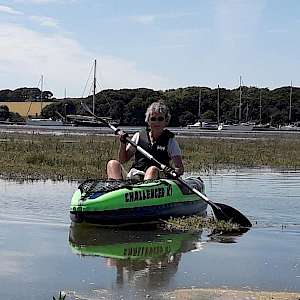In this post, volunteer ESOL teacher Julie Watson writes about the challenges faced by Syrian and Sudanese refugees resettling on the Isle of Wight:
Making a new home away does not always mean relocation to a city with a large and vibrant multicultural community. It is often a matter of potluck for refugees who know little or nothing about their new home before arriving. Then the magnitude of the difference between expectation and reality can sink in. This resettlement phase can be the start of a new journey, entailing as many upsets and challenges as the preceding displacement and migration.

I’m a volunteer teacher who chose to retire and live on the Isle of Wight. It’s an easy-going, quirky kind of place lying off the south coast of the UK, synonymous with beach holidays and coach parties in the summer months and steeped in an atmosphere reminiscent of the 1960s for much of the time. For the last three years I’ve been teaching ESOL (English for Speakers of Other Languages) to a small group of Syrian and Sudanese refugees in the process of resettling on the island. For these refugees, resettlement includes getting to grips with a new language and culture. The classroom often represents the first small step in the process of linguistic and cultural integration. In addition, it can provide a lens on the refugee’s journey through the ups and downs of their resettlement experience.
I decided to conduct a small piece of research among eleven fellow volunteer teachers to see if their observations matched my own. Some were highly experienced with teaching careers in public and/or private sector institutions encompassing all levels from primary school to higher education; others were newly qualified with little teaching experience. The refugees we teach are from diverse age groups ranging from young adults, through parents with young children, to grandparents. Nearly all finished their formal education a long time ago so returning to the classroom was a potentially daunting prospect for them. Their English language programme has been developed in-house and designed for ab initio and false beginner levels, taking a broad skills-based and practical approach. From research data generated using an anonymous online survey which combined multiple-choice and open-ended questions, a number of shared observations became apparent about how resettlement impacts on and through the classroom.
The challenge of the culturally different classroom
The classroom itself can be a microcosm of the challenges faced in the world outside. It is a culturally different place for students, and this is reflected in the teachers’ observations about the required adjustments. The teachers surveyed mentioned the need to develop their own appropriate teaching resources as these are scarce to non-existent in the commercial ESOL publishing sector. They referred to students’ learning status as total beginners in English - a challenge rarely met by most ESOL teachers today, and to needing to respond with agility and sensitivity towards students whose backgrounds and recent experiences they knew little to nothing about due to issues of confidentiality. Facing groups of mixed ability and gender containing members of the same and different families and finding ways to arrange appropriate seating and pairing among unrelated males and females also presented unexpected challenges. Teachers noticed the impact on students and were aware of the challenges for themselves:
“We have to be careful to remember these people are adults, whose lives have been ripped apart. The relatively low level of English of some students makes it almost impossible for them to discuss everyday affairs with confidence and (we need) to remember that there is more depth to them than we can currently access.”
They also became aware of students’ very different previous experience of classroom interaction and teaching methodology:
“It took a long time for students to become comfortable with teaching methods that were anything but rote learning … they still find pair work and any kind of self-assessment difficult - I think they regard the former as 'cheating' and the latter as admitting weakness. The idea that identifying gaps in learning is useful for the teacher escapes them!”
The impact of resettlement and other external factors in the classroom
There were issues impacting on classroom behaviour that teachers became aware of without fully understanding them. These seemed to have a cultural basis or derive from frustrations in students’ ongoing resettlement process and sometimes manifested as conflicts between students. One teacher mentioned noticing student envy that appeared to stem from perceived preferential treatment received by other students on the resettlement programme and several referred to frustrations that students had about ongoing aspects of the process. Beneath these, we could speculate, lay uncertainty and the disparity between expectations they had brought with them and the reality of life on a small island in an unfamiliar place. The teachers sensed this resulted from a lack of control over so many aspects of this new life, and one expressed the observation that:
“…there are differences to teaching other international students – the politics of being caught up in their ongoing attempts to understand an unfamiliar system and find the most advantageous situation/outcome for themselves: as volunteer teachers we are expected to simply teach but given the background and ongoing impacts, this can be a challenge.”
Asked to identify what kind of present or past factors might be having the most impact on students’ learning in the classroom, ‘frustrations experienced in the resettlement process’ was viewed as the most significant by all eleven teachers. This was followed by ‘relationships with other refugees’ (9 of 11 respondents) and ‘challenges due to educational level attained prior to coming to UK’ (9 of 11 respondents).
Motivation and security in the classroom
Despite such challenges, students’ motivation to learn appeared strong. Only two teachers considered the students to be ‘changeable’ in terms of their motivation level. The rest felt that the students were either quite or very motivated in their attitude towards the classes. This was supported by comments such as: “In general the students were happy and grateful to be learning.” Teachers felt students to be “kind and friendly and appreciative of our input”, “courteous and willing learners,” and “the lessons are always upbeat, cheerful, fun but hard work. They take their learning seriously and so do I.”
Interestingly, at the same time as presenting certain cultural challenges, the classroom also appears to offer a kind of security and escape, summed up well by this teacher:
“Even if there are some particular knock on effects for refugees, I think the students do see the English classroom as somewhere with its own clear set of rules that can be followed and where external issues can often be kept at bay. This may partially explain their high level of motivation.”
Some final thoughts
The challenge of resettling on a strange small island as opposed to relocating to the more familiar context (for many students) of a bustling city was evident to teachers:
“Some students have tried to explain how they feel isolated within the local community. In their own country they regularly popped in and out of the homes of friends and family members. I think that they are often lonely here.”
In spite of this, over time some of our students now appear to have adjusted remarkably well to island life and can even identify advantages in living outside the metropolis. Nevertheless, for all of them it is an ongoing process of ‘resettling’ rather than being ‘resettled’. The teaching programme continues to play an enduring part in this process and although the pandemic has forced a shift away from face-to-face to online classes, connection through the classroom has offered teachers a valuable insight into the challenges in the life of the refugee learning to ‘make home away’ and as volunteer teachers, we have hopefully helped our students on their individual journeys towards a brighter future.
With thanks to all my fellow volunteer teachers for their unstinting commitment to the teaching programme and for their insightful thoughts about their experiences.
You can find stories within the Making Home Away archive that relate to language learning here.

